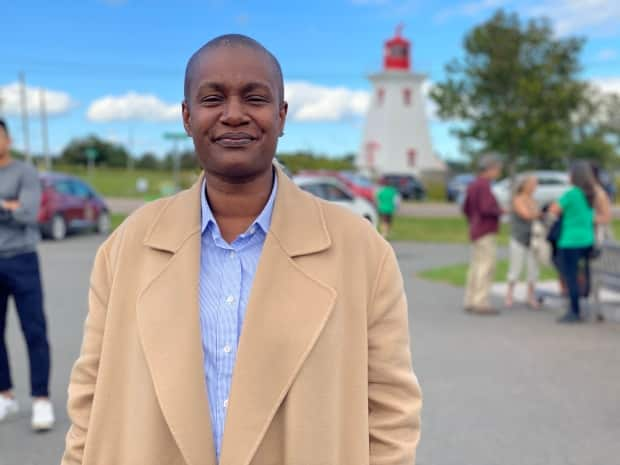What the party leaders promised on the campaign trail

Canadians head to the polls today for the final day of voting in this 44th general election and surveys suggest the result is far from certain with as many as six parties in contention for seats in Parliament.
More than 5.8 million Canadians have already voted in the advance polls, and Elections Canada has received nearly one million special ballots — a record-setting early turnout that suggests there's an energized electorate.
Poll workers will start the vote count tonight, but the outcome may not be known until tomorrow after the many mail-in ballots are verified at hundreds of returning offices nationwide.
WATCH / CBC special live coverage
This 36-day election featured policy talk on everything from housing and the COVID-19 response to Canada's place in the world, but there were also heavy doses of partisan sniping as the leaders jockeyed for front-runner status in a very close race.
Here's a look at the closing arguments from the main party leaders.
Trudeau says he's best to lead Canada through COVID
Liberal Leader Justin Trudeau called this election on Aug. 15 saying he wanted Canadians to weigh in on who should finish the fight against COVID-19 and lead the country into a post-pandemic recovery.
"Canada is today at a crossroads — a moment where we have to make a really important choice," Trudeau said at a rally in Maple, Ont., on Sunday, the last day of campaigning. "It's not just about what we're going to do in the coming months to end this pandemic for good, but also how we're going to meet the challenges of the future."
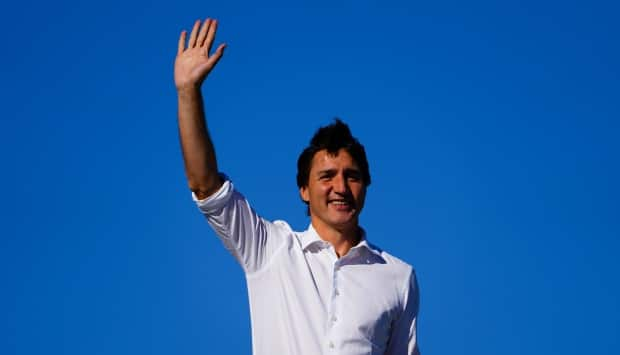
Trudeau has asked Canadians to reward his party for steering the country through the darkest days of this health crisis. He has also presented himself as a vaccine champion, the man who secured enough doses to get everyone eligible for a shot fully vaccinated by July, and the leader who will keep people safe in the fourth wave of this pandemic by pushing mandatory vaccines for federal public servants and the travelling public.
As Alberta grapples with another public health emergency under the leadership of Premier Jason Kenney, Trudeau said Sunday that conservative leaders can't be trusted to lead the country at this critical juncture.
In addition to hammering the opposition on pandemic management, Trudeau said his party has the best plan to fight climate change and get more Canadians into a home at a time when eye-popping real estate prices have kept so many out of the market. "Let's keep Canada moving forward as a progressive country," he said.
O'Toole asks voters to punish Trudeau for calling an election
The August election call came at a time when the Liberals were enjoying a sizable lead in opinion polls, but that support cratered as some voters recoiled at the thought of an election when COVID cases are on the rise.
Since day one, opposition leaders have focused their criticisms of Trudeau on the election call itself. Conservative Leader Erin O'Toole, a relative unknown at the start of the race, sought to capitalize on the frustration, slamming Trudeau as "privileged," "entitled," divisive and untrustworthy.
To shake off lingering concerns about a "secret agenda" from a man who once branded himself a "true blue" Conservative, O'Toole released the party's platform on the first full day of the campaign. Pitching a more moderate form of conservatism, O'Toole made a play for disaffected Liberal voters in central and eastern Canada.
The platform, with its slogan "secure the future," lays out a plan for a post-pandemic Canada. He's promising some $60 billion in new health-care funding over 10 years, a mental-health strategy to help the millions of Canadians battling mental anguish after lockdowns and one million new homes to help with a pandemic-fuelled housing supply crunch.
O'Toole has also promised to balance the budget in 10 years' time, a commitment made to neutralize past Liberal criticism that a Conservative-led government would result in big cuts to public spending.
According to the CBC Poll Tracker, Conservative support surged five points in the two weeks after the platform release as some voters started buying what O'Toole was selling. But the campaign hit a snag when the Conservative leader was forced to defend his firearms policy.
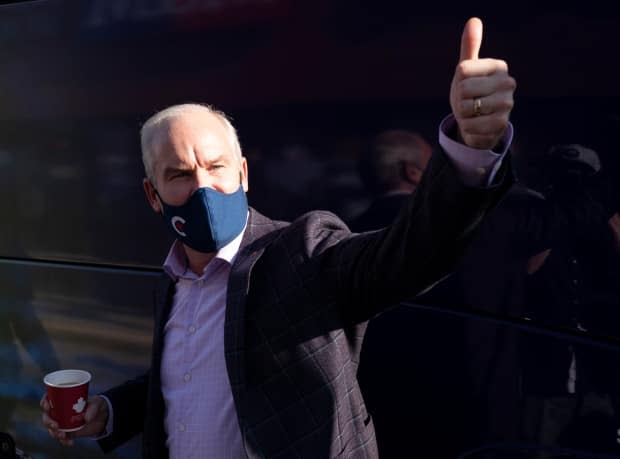
The Tory platform initially promised to repeal a ban on assault-style weapons such as those used in mass shootings. The Liberals pounced on that pledge and on O'Toole's past association with the gun lobby. With his support softening in Ontario, the Tory leader shifted his position, promising to maintain the Liberal ban until an independent review by firearms experts was completed.
O'Toole also faced questions about his support for vaccines at every one of his campaign press conferences.
While personally pro-vaccine, O'Toole has called a Liberal plan to implement a vaccine mandate for federal bureaucrats, transportation workers and most passengers travelling by air and rail a divisive program that will lead to the "politicization of the pandemic."
O'Toole has also repeatedly dodged questions about just how many people carrying the Conservative banner in this race have had at least one shot. As a result, Trudeau has characterized O'Toole as a leader beholden to the "far-right, anti-vax" wing of the Conservative Party.
O'Toole hit back, saying Trudeau was trying to distract from his "scandal-shredded" reputation after six years in government.
"Justin Trudeau hasn't talked about the future of our great country. He hasn't provided a plan for Canada. Instead, he has veered into personal attacks, dividing Canadians and using American-style, misleading politics in an election that is only about himself," O'Toole said Saturday at a rally in Kitchener, Ont., asking Canadians to punish Trudeau for triggering "an unnecessary $600 million pandemic election."
People's Party could complicate Conservative path to power
O'Toole's path to power may also be complicated by another party leader. For the first time in nearly two decades, conservative-minded voters have two viable options to choose from in this election: the Conservatives and the People's Party of Canada (PPC) led by former Tory MP Maxime Bernier.
Public health measures such as lockdowns slowed the spread of COVID-19 — and likely saved lives — but they also prompted anger and frustration among some Canadians who saw their livelihoods destroyed as economic and social life ground to a halt.
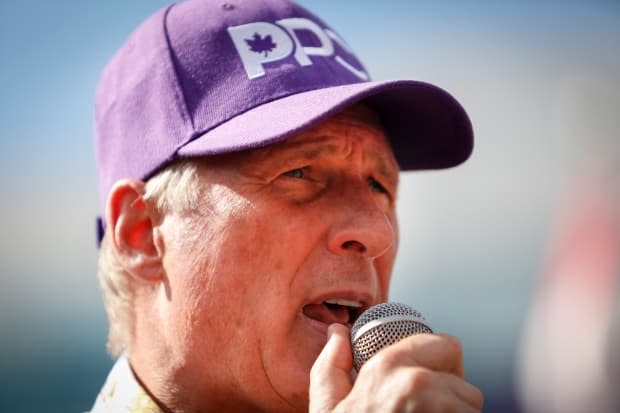
The PPC welcomed those voters with open arms. A party promising a radically smaller government with fewer regulations was suddenly embraced by people who saw government as an oppressive force.
Bernier, a libertarian who has long railed against government overreach, became a champion of the "no more lockdowns" crowd, routinely appearing at well-attended protests against these restrictions. He is also vehemently opposed to vaccine passports — a position that has given the PPC a boost in the polls. Thanks to new support from the unvaccinated, Bernier's movement is expected to perform much better than the 1.6 per cent of the national vote it fetched in the 2019 election.
"O'Toole has flip-flopped and adopted the Liberal program on the few remaining issues where there were still differences between the two parties, such as the carbon tax, gun bans and COVID passports," Bernier said in an emailed statement to CBC News. "Mr. O'Toole will have to live with the consequences of his failing strategy."
It's not just right-wing parties that will have to contend with vote splits. The CBC Poll Tracker suggests Liberal support is marginally lower than it was after the 2019 election, while NDP support is roughly three points higher than it was following that campaign. This NDP strength could result in Liberal losses, particularly in Ontario and the Lower Mainland of B.C.
In the past, groups looking to stop vote-splitting on the left have called on progressive voters to ignore their party preferences and rally behind the candidates with the best chance of defeating Conservatives.
It's a message Trudeau reiterated in the last two days of this campaign as he told progressive voters that only Liberals can keep the Conservatives out of power.
"You can vote both with your desire to stop the Conservatives and your desire to bring forward the most progressive government in the history of the country if you vote Liberal," Trudeau told a crowd of supporters in Markham, Ont., on Saturday.
Singh says Trudeau is 'bad for Canada'
NDP Leader Jagmeet Singh who, polls suggest, is personally popular with voters, has tried to improve his party's fortunes after a disappointing 2019 campaign. He has urged voters to reject Liberal warnings about a fractured left-wing vote and instead pick the party they really want to govern.
From the opening bell, Singh has branded Trudeau as a failed leader who doesn't deserve another term. Those attacks have only become more pointed in the dying days of this campaign as Singh looks to keep progressive voters in the NDP fold and pick off Liberals frustrated with Trudeau's performance.
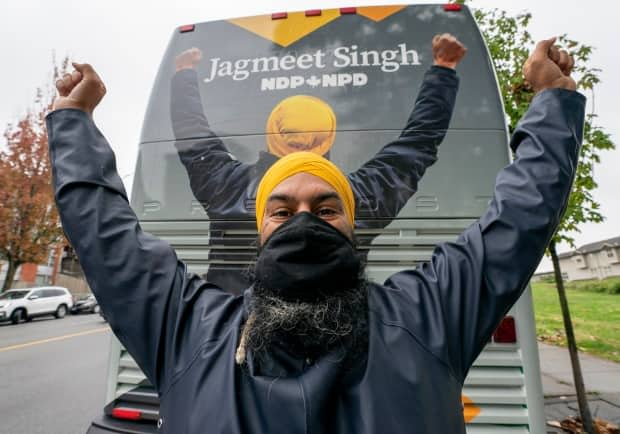
"We think Mr. Trudeau is bad for Canada, because he's failed on the crises and made things worse, not better," Singh said Friday, condemning Trudeau for voting against non-binding NDP motions on pharmacare and long-term care homes.
Singh has also pointed to higher greenhouse gas emissions and a tax system he said is skewed toward the "ultra-rich."
"He is bad for Canada. He was an abject failure," Singh said of Trudeau.
Singh's campaign has been laser-focused on promoting a plan to make the wealthy pay much more in taxes to help cover the cost of new social programs. He has brandished his party's record in the last Parliament — NDP MPs pushed for more generous pandemic-related welfare programs — as proof that only New Democrats "will fight for you, will lift you up."
"You can vote for Mr. Trudeau, who is all for show, who supports the ultra-wealthy, supports the super-rich and lets you down. Or you can vote for New Democrats. We are fighters and we are here for you," he said at a Saturday campaign stop in Saskatoon.
But Singh has faced criticism for putting out a platform that calls for $200 billion in new spending with few details on how any of this transformative change would actually be implemented.
The party's climate policy has been panned by experts, who say it's both vague and unrealistic. A wealth tax like the one the NDP is proposing has been tried in other countries only to be repealed because it fell well short of revenue projections.
Greens won't be on the ballot in nearly a third of ridings
For months, the Green Party has been beset with internal squabbling that has hampered their electoral efforts.
The party's leader, Annamie Paul, has spent nearly all of the campaign in the riding of Toronto Centre, where she is running for a third time.
Some Green candidates said they didn't want Paul in their riding during this race. But the leader was out stumping for the two Green incumbents, Elizabeth May and Paul Manly, over the weekend as the party looks to maintain its parliamentary delegation.
"I am hoping again to see some of these candidates elected on Monday because their Green voices are needed in Ottawa to talk about the climate, to be champions for the climate and for their communities," Paul said at a Sunday campaign stop in Toronto.
Unlike in 2019, when the party ran candidates in all 338 ridings, there won't be a Green on the ballot in nearly a third of all local races — which could give some Liberal and NDP candidates a boost in this nail-biter election.
